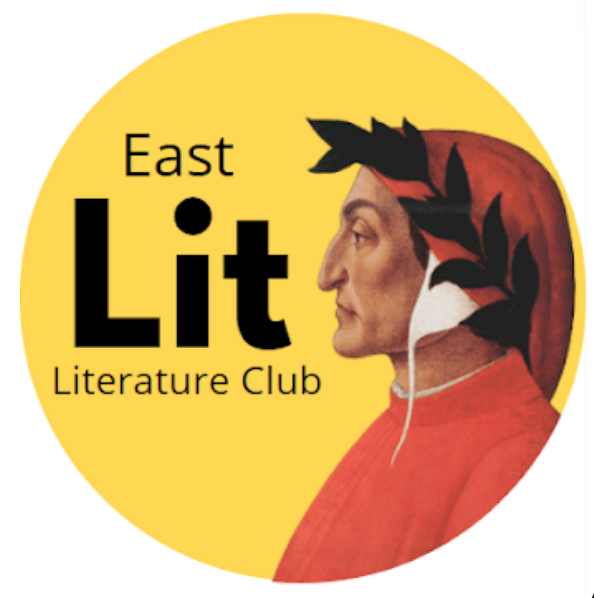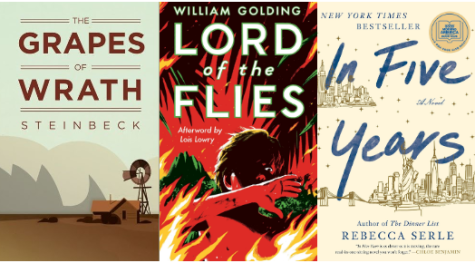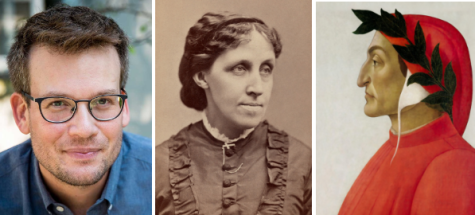Three Must Read Books and Authors for Your November TBR List

East Literature Club is a club at Cherry Hill East dedicated to people who love reading.
Books: you can never have enough! That’s why EastLit has three authors and books that are mandatory adds to any “To Be Read” list every month. Peruse these peer-written reviews and prepare to run, not walk, to your nearest bookstore to add these picks to your shelf.
Must Reads for the Month of November
1. The Grapes of Wrath – Review by Brooke Warren (‘23)
The 1900s brought a new wave of westward expansion, industrialization, and capitalism. Big business blossomed as monopolization of industry sky-rocketed elites onto a higher rung in the wealth ladder. A reliance on those big businesses as the basis of the American economy led to the crash of the market coming into the 1930s. The Grapes of Wrath takes place in the Dust Bowl era of the 1930s, a time near the Great Depression, struck by drought and failure of farming. Working class farmers faced many hardships as the wealthy struck down on the land dues in the south. The opportunity for work stooped to a low. Author John Steinbeck writes the story of the Joad family as they navigate the troubles of losing their farm and traveling westward to California. This book serves as a commentary on the capitalistic business centered society that rose to prominence in the 1900s.
The motif of a bank monster repeatedly appears to represent the adversities of a harsh economy dominated by big business. Steinbeck personifies the bank to vilify it, making it clear to the reader the extent that the bank ended the lives of the characters. He also reprehends the elite wealth holders “for the quality of owning” and how that “freezes [them] forever into ‘I,’ and cuts [them] off forever from the ‘we’’’ (152). Steinbeck underlines the separation caused by the “owning” and how materialism “freezes” you from the rest of society with this metaphor. Steinbeck’s nuanced illustrations of capitalism also highlights underprivileged groups’ experience in a competitive economy. He shows the dehumanization of these groups of people by showing the belittlement cast upon them with name calling and violent acts against them. Authority figures in this society demean their subordinates, supporting the stripping of their rights as evident in this text that starts as a protest of equal rights and ends with the funneling of all migrants as one low class.
Throughout his novel, Steinbeck underlines the experiences of the working class during the Dust Bowl era to critique the economic trend of the time period. By demonizing a characterized “bank monster,” he relates the adversities of brutal business to a creature that eats away at families. He unites the experience of marginalized groups by demonstrating the perils and epithets thrown at these groups. Overall, John Steinbeck emphasized injustices existing in society and educated about the lifestyles of the time, stirring the conversation of the state of America.
 2. Lord of the Flies – Review by Andrew Aeillo (‘23)
2. Lord of the Flies – Review by Andrew Aeillo (‘23)
William Golding’s Lord of the Flies teaches the reader about the truth of human nature and human behavior. By providing alternate history with political satire, Golding’s classic truly illuminates traits hidden inside all humans. When a society is formed, it contains both perfections and imperfections, which Lord of the Flies demonstrates articulately.
The novel’s backdrop begins on a mysterious island with a main character, Ralph. Ralph meets another boy called only “Piggy”. Here, the reader learns that a plane escaping children crashed, trying to escape a nuclear war in the U. K. Ralph and Piggy soon meet the rest of the boys, including Simon and Jack. Ralph establishes an assembly, using a conch shell, while the boys work to survive and find a rescue. Division began early, mainly between Piggy and the other boys, but it soon became Piggy and Ralph against Jack. Piggy and Ralph are concerned with keeping order and getting rescued, while Jack only cares about hunting. Simon is later killed out of a mass hysteria over a “beast”, and the boys split into two. Most of the older boys revert to primitive ways and follow their “chief”, Jack, while Ralph and Piggy watch over the younger boys. (Spoiler ahead) Several feuds occur, one leading to the death of Piggy. As Ralph, the only civilized boy, runs for his life, he meets a naval officer at the rescue. The savages revert back and realize what they become, ending the novel in tears.
Golding’s message throughout the novel is that humans are inherently savage. When common luxuries are stripped, we revert to primitive ways, becoming animals. The novel shows aspects of civilization through the boys’ struggles and traits. Each main character possibly represents certain aspects of civilization. Ralph, order and democracy, Piggy, logic; Simon, goodness; and Jack, evil. While Lord of the Flies is a fun novel to read, its intention is to remind us of savagery buried inside, and the troubles and difficulties that plague civilization.
3. In Five Years – Review by Inesa Linker (‘23)
Rebecca Serle’s novel In Five Years is a stunningly heartbreaking love story, offering its readers an interesting take on how life changes.
Beginning in present day (2020), our narrator Dannie Kohan is about to get everything she wants. She’s living in New York City, with her boyfriend David-soon to be affianced- and working her way up the corporate ladder at her dream job. But when Dannie wakes up and suddenly findherself five years in the future, engaged and living with a man who is not David, her whole world shifts. Dannie lives five years in the future for exactly one hour before returning to her present. Now that she’s back to her perfectly planned life, can she forget everything she’s just seen? Dannie thinks she can, until everything changes again and she is once again confronted with the future head on. The novel follows Dannie getting ever closer to the five year mark and as the perfect pieces of her life begin to crumble, she finds herself wondering if her plan could have saved her. Told through multiple time skips (both forwards and backwards), In Five Years confronts its readers with the hard truth that life can’t be planned. As Dannie’s life flips and spins, the reader finds themselves looking inward as well, questioning whether their path is truly the one they’re supposed to follow.
In Five Years presents itself originally as a love story, but it is far from your classic romance. Serle digs deep and examines all the relationships of Dannie’s life, including her relationship with her best friend Bella, who is the complete antithesis of everything Dannie is, exploring not only romance but also the nuances of female friendship. Nominated as a Good Morning America book club pick, Serle’s In Five Years is not to be missed and will leave you not only with tears, but with hope.
Can’t Miss Authors for the Month of November

1. John Green – Biography by Katherine Li (‘23)
If you were an avid book reader in your teenage years, you probably recognize the name John Green, an American author and content creator who specializes in writing young adult fiction novels and whose target audience includes early teenagers and beyond. No teenage bookworm goes without stumbling across one of his works—and not without reason; Green has won a number of prestigious awards including the Michael L. Printz Award, an Edgar Allen Poe Award, and the Corine Literature Prize. His most popular novel, undoubtedly The Fault in Our Stars, was made into an award-winning movie featuring Ansel Elgort and Shailene Woodley.
Green’s renowned writing style is a wistful and sentimental one, and he breathes life into his young characters through portraying love and catastrophe. Some examples of his work include Paper Towns, a mystery slash romance young adult novel about teenager Quentin who investigates the disappearance of a girl even more mysterious, and Looking for Alaska, a coming-of-age novel that dives into topics of grief through the investigation of a young girl’s strange death. Outside of writing, Green is the co-creator of the educational platform Crash Course (other co-creator being young brother Hank Green), is one half of the vlogbrothers on YouTube (other half being Hank Green), and hosts two podcasts, The Anthropocene Reviewed and Dear Hank & John (with Hank Green). Truly, one cannot mention John Green without a nod towards Hank Green as well. Together, the siblings promote social activism and education through literature, media, VidCon (which they founded), and more.
Even now, Green seems to have big plans for the future: his newest book, The Anthropocene Reviewed (sharing a name with his podcast) came out in May of 2021, and filming for an upcoming movie based off Green’s 2017 novel Turtles All The Way Down is underway at the moment, as of May 2022.
2. Louisa May Alcott – Biography by Sage Levy (‘23)
Louisa May Alcott was an American author best known for the classic Little Women (1868). She initially wrote under the androgynous pseudonym A.M. Barnard, which was discovered in 2008 by a Harvard researcher.
Alcott was born in Germantown, Pennsylvania. The majority of her early education was under the direction of her father in the company of family friends such as Henry David Thoreau, Ralph Waldo Emerson, and Theodore Parker. After her childhood, she spent the majority of her life in Concord and Boston. She worked various jobs to support her family such as domestic servitude and teaching. During the Civil War, she worked in Washington, D.C. as a nurse in a Union hospital. Unbeknown to most, Alcott began her writing career in 1851 under the pen name Flora Fairfield. Under this pseudonym, she published poems, thrillers, juvenile tales, and short stories. She began to use the name A.M. Barnard in 1862, under which she wrote plays which were to be produced and performed in Boston. She did not begin writing under her real name until 1865 when she became an editor for Merry’s Museum, a girl’s magazine.
In 1868, she published Little Women, undoubtedly her most well known work. The success of this novel gave her the financial stability to continue a full-time career as an author. She wrote several more novels over the course of her life, many of which centered around the characters of Little Women and were loosely based on her own life. These novels include Little Men (1871), Eight Cousins (1875) and Jo’s Boys (1886).
3. Dante Alighieri – Biography by Eric Li (‘23)
Arguably the greatest poet in history, Dante Alighieri was born in 1265 in Florence, Italy. Throughout the world, Dante is renowned for his Divine Comedy, an epic poem that depicts the soul’s journey through Hell, Purgatory, and Heaven.
Although many details of Dante’s childhood are unknown, we can learn about him through his autobiographical writings, where he describes one of the most important moments in his life. At a party, Dante met the woman he would love all his life, Beatrice Portinari, when he was nine and she was eight. Unfortunately, Dante and Beatrice were unable to marry each other, because they were both entered into separate arranged marriages by their families (the custom at the time). When Beatrice died during childbirth at twenty four years old, Dante vowed to write poems that would praise her virtue. In The New Life, for example, Dante praises Beatrice for renewing his Christian faith.
In addition to being a poet, Dante was also a statesman. To truly understand Dante’s life, we must first understand his world. In Dante’s 13th-century Florence, Italy didn’t exist. Rather, the country was divided into various city-states (each with its own government) which the Pope often attempted to control. Thus, two Florentine political parties arose: the White Guelphs and the Black Guelphs. The White Guelphs opposed the Pope’s control of Florence, while the Black Guelphs supported Papal influence. As a leading White Guelph, Dante believed that the Pope should govern spiritual affairs, while the Empire should govern state affairs, following the tradition of ancient Rome. Eventually, the Black Guelphs seized power in Florence, leveraging their power to unjustly accuse Dante (their political rival) of corruption and confiscate his property and wealth. The Black Guelphs then exiled the now-impoverished Dante from Florence, his beloved city, in 1302.
Although his exile left a traumatic mark on his life, it nevertheless allowed him to mature both as a poet and politician. In exile, Dante composed his masterpiece, The Divine Comedy, which describes the autobiographical journey of Dante himself, a Christian pilgrim who undertakes his spiritual journey through Hell, Purgatory, and Heaven to achieve salvation. In The Divine Comedy‘s beginning, Dante finds himself lost (both spiritually and literally) in a dark forest. Beatrice, Dante’s muse who pities him in Heaven, sends the Roman poet Virgil, author of the Aeneid, to rescue Dante and guide him through Hell and Purgatory. Virgil thus guides Dante through Hell, where he will recognize sin, and Purgatory, where he will repent for sin. Once he repents for his sins and becomes blessed, Dante will enter Heaven, where Beatrice herself will guide him. This iconic narrative of The Divine Comedy has inspired figures such as Michelangelo, Geoffrey Chaucer, T.S. Eliot, and more.
Later in exile, Dante also evolved politically, transcending the politics of Florence (in which he had participated) and formulating his own unique convictions. Dante would grow to adopt a traditionalist political position, regarding the unified governance and Christian virtues of ancient Rome as the model for his own age, a discordant 13th-century Italy.
Throughout his life, Dante remained a devout Christian and always dreamed of becoming an honorable and famed poet. To both these ends, he succeeded. Dante’s Divine Comedy stands as the most venerated work of Christian literature throughout the world, and his immense influence endures to this day, inspiring people from all walks of life.

